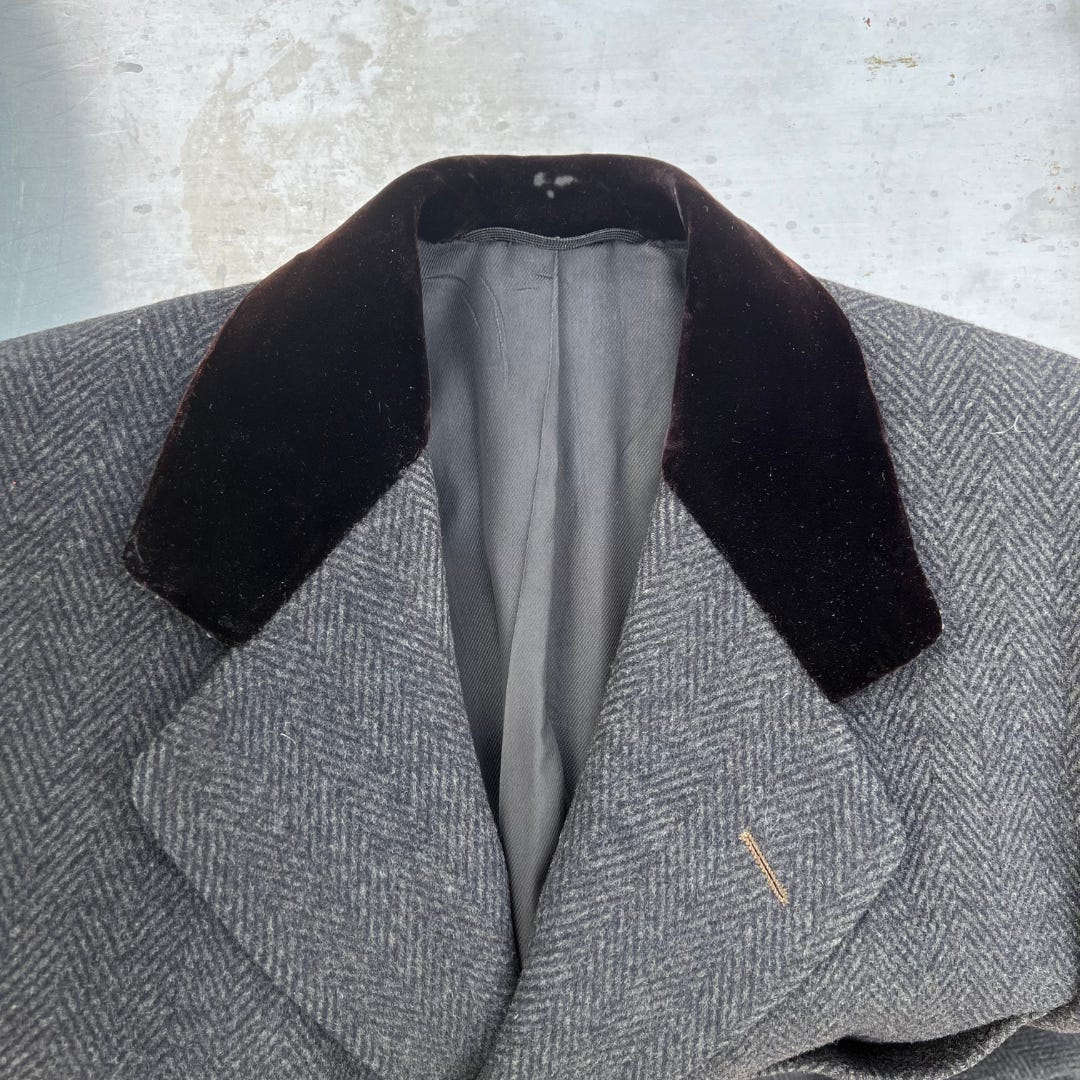GRAMPY'S COAT
“...he came every week for Sunday dinner, arriving a few hours after we got back from church. On cold days he wore a charcoal grey herringbone Chesterfield….”
Until I was four, my family and I lived with my mother's father in his big house on the outskirts of Manchester, Connecticut, a town near Hartford. Grampy was an engineer for the state highway department. His house was gloomy and chilly, heated by an ancient coal furnace. When the coal truck came, I’d crouch on the cellar steps, fascinated and terrified by the terrific roar as the glittering black chunks thundered down the chute. Grampy wasn’t scared; he pulled on thick leather gloves, hefted a square-edged coal shovel, and began feeding the furnace’s glowing maw.
My sister and I spent hours playing on the living room rug while Grampy sat nearby reading the newspaper. Once he showed us a hidden compartment in the cribbage board he kept on a high shelf. Inside were tiny pegs that fit into the holes of the board. We pretended the pegs were people with families and lives of their own.
After we moved across town to our own home, he came every week for Sunday dinner, arriving a few hours after we got back from church. On cold days he wore a charcoal gray herringbone Chesterfield and a velvet fedora with a feather in the crown; beneath the coat, a button-down shirt and neatly pressed gabardine trousers. My father would help him off with his coat and Grampy would sit in the flowered chair by the fireplace while the four of us kids lined up on the sofa for some awkward chat about school. Only after Grampy accepted a gin and tonic from my father, who settled in a chair with his own drink, were we allowed to leave.
In later years, Grampy moved to a small apartment in town. When I was a teenager, still too young for working papers, he offered to pay me a modest wage to clean for him on Saturday mornings while he played cribbage at the Elks Club. Pushing the heavy vacuum cleaner around his spotless apartment, I inspected his spare belongings for clues to his inner life.
Two framed portraits told me what mattered most to him: my mother’s nursing school graduation photo, and an oil painting of her brother, my Uncle Freddie, handsome and unsmiling in his Air Force uniform. I wondered why there were no pictures of my grandmother, who had died young, leaving Grampy with two teenagers to raise alone. Without being told, I knew that in my family, that sort of question wasn’t polite to ask.
Grampy was the second youngest of ten children born to Canadian immigrant parents. There’s just one photograph of his family—so many children, such serious expressions. On the rare occasions when he mentioned them, his face would brighten as he spoke the curious names of his brothers—Heldage, Adelmar, Emile, and the one they called Chick. He never talked about his parents, nor did I ever hear him mention his late wife, Blanche, the grandmother I never knew.
Later in life I came to understand more about the stoic generation that showed affection sparingly, even toward the people they held most dear. It took me years to recognize Grampy’s quiet contributions to our lives—watching my younger brother and sister after school, driving us to catechism or home from the library when it rained—as expressions of love.
After his death, when my parents distributed Grampy’s possessions, I asked for the charcoal gray Chesterfield. It fit me perfectly, as if tailored for my own body, and has kept me warm through many winters. Unpretentious but dignified, it always makes me think of my grandfather and sometimes calls to mind the rare hugs he gave me when he was alive.
—Donna Moriarty
Donna Moriarty is a writer, editor, playwright and the author of Not Just Words: How a Good Apology Makes You Braver, Bolder, and Better at Life. She’s currently working on a memoir.


